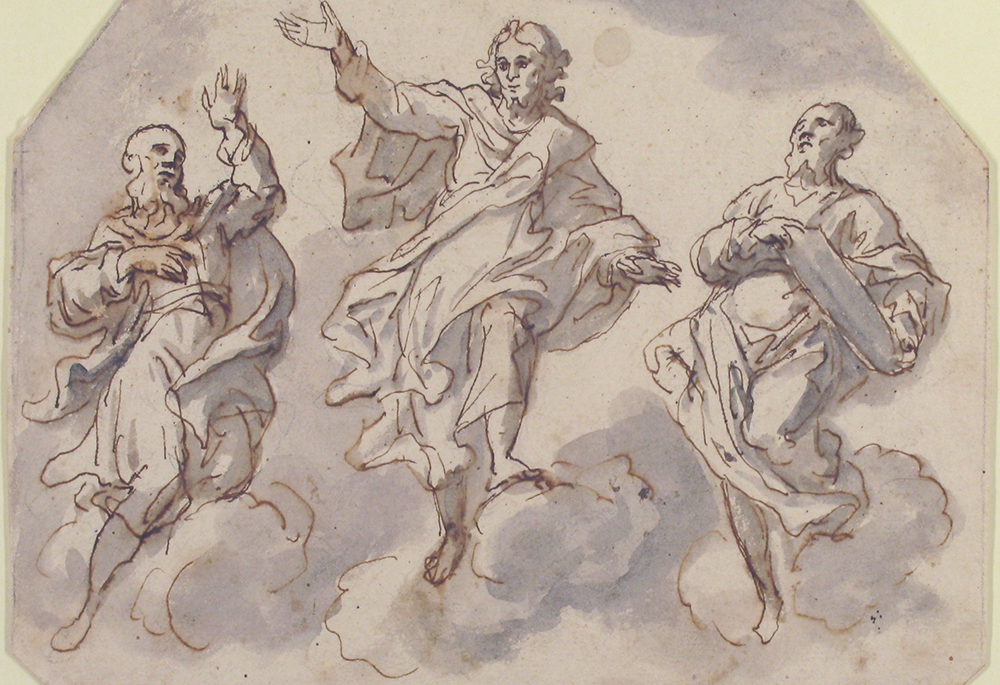
"The Transfiguration," 1565-1608 drawing by Francesco Curia (Metropolitan Museum of Art)
The readings that tell the story of Jesus' transfiguration (Matthew 17:1-10, Mark 9:2-10, and Luke 9:28-36) are heard twice a year: on the feast day itself and then again during Lent. It's rather unusual to hear the same Scripture twice within one year, so clearly there is something we need to pay attention to here.
Jesus and three of his companions go up the mountain and have what can only be described as a "God encounter." In all three Gospel passages I find two pieces to the message: how good it is for us to be here, and, you are my beloved.
Oftentimes, Jesus is portrayed as a rather solitary figure, a leader who was off by himself. However, there are several Gospel stories of Jesus being with not only those he was ministering to but also with his friends, family and often unknown support people. Just like all healthy people, Jesus had friends with whom he spent time, shared very personal and profound experiences, and shared ordinary day to day existence. Those who accompanied Jesus up the mountain and witnessed his transfiguration recognized that it was no ordinary afternoon with their friend.
Scripture tells us they didn't know what they were seeing and experiencing or what to say. Peter, my speak-first-think-later friend, boldly proclaims, "How good it is for us to be here." Think of a time when you've been a part of something or witnessed something you didn't understand, completely or at all, but knew was important. My most recent experience of that was watching a sitting president withdraw from the 2024 presidential race with just over 100 days until the election. The so-called experts made all kinds of conjectures about what that meant and what it will mean for the presidential election in November. No one really knows, and in the fast-paced world we live in, November is a lifetime away.
Advertisement
Another, more personally profound experience, was me entering my congregation. On Aug. 6, 1986, the feast of the Transfiguration, I became an affiliate (postulant). Coincidently, the city flooded as we received 7 inches of rain that day. Did I know what entering my congregation would mean? Sort of, but not really. But like Peter, I knew it was important to be there.
My understanding of my entrance into community would evolve, especially during the time of initial formation, and continues to do so nearly 40 years later. As far as the rain, during my annual retreat every year since my entrance into community, regardless of time of year or location, the experience has included a significant rain event. I've come to see it as cleansing, a fresh start if you will, as well as a sensual reminder of my response to God's call.
The second part of the message Jesus and his companions heard was, "You are my beloved." This phrase, directed at Jesus but also us, is as important as Peter's rambling comment about "being here." Part of the human condition is self-doubt. People wonder about their purpose or if their ministry and relationships are "right." Jesus wondered too. He was loved and followed largely by outcasts; the regular folks and religious leaders were constantly looking to get rid of him. As noted in the final Garden of Gethsemane stories, Jesus wondered about his life and purpose and if any of it made a difference.
For those of us living consecrated life, I hear more times than I can count the wondering if we are "good enough." If we are on the path God wants us to be on. We all need the reassurance offered on that mountain, that "you are my beloved." If we hear that message, do we believe it and how do we act because of it?
For me personally, remembering I am a beloved of God gives me strength and courage, especially when facing the unknown. Tapped for new responsibilities because of a talent I've not recognized? OK, because someone sees my potential. Continuing education in emerging areas of focus in our global society? OK, because of my willingness to explore the societal privilege I enjoy because of my birth history.
Transfiguration is risky if we really open ourselves to it. It is a call to radical change! Jesus and his friends were not the same after their "God encounter," and that's the point. We need to get out of our daily routine and take a fresh look at life: who we are, how we behave, what we can offer our needy world, and what we can receive as well. The list could go on. It's good to be here and we are beloved — so what do we do with that?





